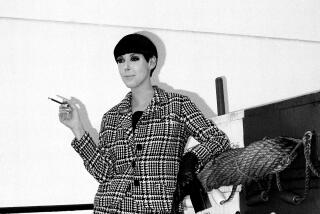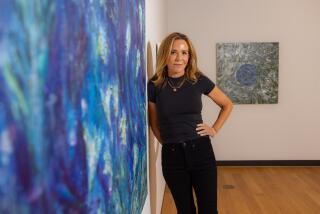Q&A: A portrait of unconventional modern art maven Peggy Guggenheim
- Share via
A key figure in the 20th century art world whose soignée, jet-set existence concealed great pain and sadness, Peggy Guggenheim was a blue-blood force of nature who elevated art collecting to a noble pursuit while helping to launch the careers of Jackson Pollock, Mark Rothko and other modern greats.
“She was a modern woman at a time when the idea of a modern woman didn’t exist,” said Lisa Immordino Vreeland, director of the new documentary “Peggy Guggenheim: Art Addict,” opening this week.
The documentary limns the unconventional life of the American heiress who broke with class conventions to amass an unprecedented art collection of modern works. She later secured her legacy with the Peggy Guggenheim Collection, her personal museum at her palazzo in Venice, Italy.
SIGN UP for the free Essential Arts & Culture newsletter >>
Drawing on a biography by Jacqueline Bograd Weld as well as previously unheard audiotapes between Guggenheim and Weld, the documentary explores its subject’s sometimes dark personal life — deaths of loved ones, her broken marriage and her fraught relationship with her daughter, Pegeen.
It also touches on her sexual affairs with prominent men and her botched plastic surgery.
“Peggy Guggenheim” features interviews with notable figures including Karole Vail (a descendant who works at the Guggenheim Museum in New York), writer Francine Prose, art dealer Larry Gagosian, actor Robert De Niro, art dealer-curator Jeffrey Deitch and Los Angeles County Museum of Art Director Michael Govan.
Speaking by phone from New York, Immordino Vreeland discussed the making of the documentary. Here are excerpts from the conversation:
Why were you so interested in Peggy Guggenheim?
I love the idea of transformation — characters who decide at a point in life that they want to completely change themselves.
Guggenheim’s life has been written about in numerous books, including her own autobiography. Was there anything surprising that you learned while making the documentary?
Peggy wrote in a nonchalant tone for things that were horrible. She had seven abortions, and she wrote in this off-handed way. Every time she wrote about sad things in her life, it would just be a fact. She was never in touch with her feelings. She wasn’t given love as a child, and so she didn’t know how to show love. It was an overwhelming sadness.
Peggy Guggenheim’s sexual exploits were about her declaring her independence.
— Lisa Immordino Vreeland, director of the film “Art Addict”
You devote significant time in the movie to her famous love life.
Her sexual exploits were about her declaring her independence. I’m not sure it was about being a feminist. I think it was her saying, “I like men.”
What about her troubled relationship with her daughter, Pegeen?
This comes back to the fact that [Peggy’s] mother and father never played a significant role in her life, and so she didn’t know how to be a mother. She described her relationship with Pegeen as being lovers — which was an odd thing to say. When Peggy divorced her husband [Laurence Vail], they each took a child, which was also strange. Peggy didn’t know love, and she could not give it. But I think also that Pegeen was not well mentally.
What makes Peggy Guggenheim relevant today?
She approached life in a very contemporary fashion. She had an influence in London, Paris, New York and Venice. She touched these artists, and there was something that enabled these artists to get her support. There are not many figures who have done this. I think of her as a facilitator and conduit — it’s being in the right place at the right time. But it doesn’t work if you don’t have the right personality, and she did.
ALSO:
First look inside LACMA’s Rain Room: an indoor storm where you won’t get wet...honest
Getty acquires first photos ever taken of ancient ruins ISIS recently destroyed
An early look in the Broad museum reveals a show that doesn’t quite gel
More to Read
The biggest entertainment stories
Get our big stories about Hollywood, film, television, music, arts, culture and more right in your inbox as soon as they publish.
You may occasionally receive promotional content from the Los Angeles Times.











